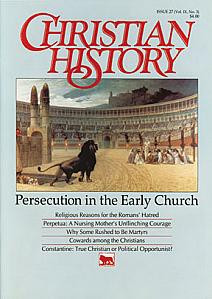Heroic Andrew Defeated a Persian Army then Died for Christ
THE MOST VALIANT deeds of the most notable soldier may not be sufficient to protect one from those who hate Christ. Andrew Stratelates found it so.
Andrew commanded a division of the Roman army in the late third century. Sent to battle the Persians, he faced stiff odds. According to tradition, he increased those odds by hand-picking just one thousand men to go up against the enemy with him. A Christian, he was inspired by the Biblical story of Gideon, who selected three hundred men to challenge a mighty coalition of Israel’s enemies. “My God, who made heaven and earth, is the true God,” Andrew told his men, adding that their gods were demons. “Put aside your error, call with me upon him who is truly God, and you will see your foes dead and driven away before you like smoke or like dust from the threshing-floor.”
Andrew’s soldiers routed the Persians. The seemingly supernatural victory convinced many of them that Christ was indeed supreme, and they converted to Christianity.
But when Antiochus, the governor of Syria, learned that Andrew had “gone mad” and was teaching the gospel of Christ, he brought him and several Christian soldiers to court. Antiochus hated Christianity. He threatened the general with torture if he did not deny the faith, and tried to frighten him with accounts of Christians he had already tortured to death.
Emboldened by the knowledge that these other believers had stood true under torture, Andrew replied, “If all those that you have named...have emerged victors, and carry their athletic crowns in the presence of Christ (who is God) why would I, a friend, or rather servant of my Lord Jesus Christ, not be eager also to remain forever constant, in order to enjoy the same rewards with them?”
Antiochus tortured Andrew on a bed of heated bronze and nailed several of his Christian soldiers to stakes. He then imprisoned them and dispatched a secret message to Emperor Galerius, asking how he should handle the case. Galerius counseled that killing a war hero like Andrew without just cause would undermine public confidence in the legal system, so he ordered Antiochus to release the men and find a pretext to punish their faith later.
Following his release, Andrew traveled to Tarsus in Celicia, requesting baptism at the hand of Bishop Peter. Celicia’s military commander, Seleucus, was also a pagan who detested Christianity, and Antiochus requested he destroy Andrew. Learning of the plot, Andrew took the words of Christ literally: “If they persecute you in one city, flee to another.” He fled with his loyal men from place to place. When Seleucus finally cornered him at the straits of Taurus, Andrew helped some of his men escape. He himself was captured, tortured, and killed on this day, 19 August 305,* with a large number of Christian soldiers. Bishop Peter and another bishop marveled at their heroic and unresisting end.
—Dan Graves
--------
*The year and some details are open to question.
----- ----- -----
For more, read Christian History #27, Persecution in the Early Church
(Never miss an issue of Christian History. Subscribe now.)
Watch Trial And Testimony of the Early Church at RedeemTV.
The Trial and Testimony of the Early Church can be purchased at Vision Video.







